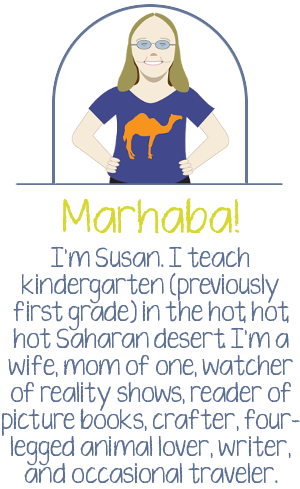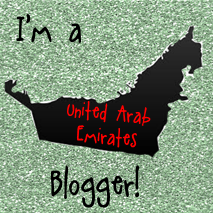Let me start with a disclaimer. I do not speak fluent Arabic. Nor can I understand conversations but I have picked up some handy-dandy words after living here for two+ years that I thought I would share with you. From time to time you might encounter these words in my blog because when I use them I feel really cool and smart. And now you can too! (Well, unless my pronunciations aren't accurate, then you'll just sound like an idiot).
Sayaara (see air uh)
Kabeer (kuh-bear)

Marhaba (mar-huh-buh)
Loosely translated it means welcome (this is how I use it) or hi.
Salam (suh-lom)
Shortened version of the typical greeting. Means hi.
Hammam (huh-mom)
First time I head this in my classroom I thought the student was wanting their mom (first day of school and all that). Unfortunately no one gave me a heads up that it means bathroom. Jeesh. Good thing I learned it quickly after the first day (the hand gestures and pointing really helped clue me in).
Shanta (shawn-tuh)
I use this in the classroom to mean backpack. But really it just means a bag like you get your groceries or medication in after a hard day at work. But I swear I said it a million times in the classroom to my firsties and they understood what I meant.
La (la)
As in the Christmas carol but in Arabic it means no. Bet you didn't know that all these years you were singing la la la you were really saying no, no, no. To be used sparingly in the classroom, these kids hate being told no and don't hear it very often.
Aiwa (eye-wuh)
Yes. If you want to say this like a native speaker give a short pause between syllables and on the second your voice should go up a little. And draw the first syllable out longer. There, like that!
Banat (buh-not)
This means a group of girls. Not the "Girl, you lyin" sort of girl but the "I am a girl" version. I taught a class full of girls (no boys) so I used this word a lot. A. Lot.
Bent (bent)
This is for one girl.
Waled (wahl-ed)
This means boy. Not to be used as "oh, boy" or it could be taken as insult. Boys are king here.
Khalem (cah-lum)
I used this for pencil but it means any type of writing utensil so you could also use it for pen.
Sayaara (see air uh)
Use this at the end of teaching to figure out whose parents are picking them up. It translates to car. So I would make my two lines (no walkers here in the hot, hot desert) and say bus, sayaara to line them up.
Taboor (tuh-bore)
Which brings me to...line. As in line up. Stand in line. Walk in line. Draw a line. See that line? Make your line the same.
Same Same
Not really Arabic but I thought I would throw it in here. For some reason most people living here (apart from other Westerners with a good grasp of the English language) don't understand the word same. But when you say same-same. Click! They understand perfectly. But you have to say it when pointing widly. For instance at the store trying to get internet connected. Point to the teacher beside you in line who managed to breakthrough the communication barrier and are on their way to scheduling service. Good. Now point to yourself and say same-same. You will feel like an idiot but when it works you will find yourself saying it constantly. Especially after class mini lessons.
Inshallah, in'shallah, insha'allah (in-shawl-uh)
You will hear this often. Oh so often. To the point where you want to take off your shoe and smack someone with it if they say it. Please restrain yourself. Especially here as there are hefty penalties for things like that such as deportation. The meaning of inshallah is God willing, or if the God wills it. How it's actually used is more like this:
Me: (on phone third time with apartment maintenance about the AC). So you will come today?
Maintenance man: Inshallah
Me: you said that yesterday but never came to fix it.
Maintenance man: (in a quieter voice) inshallah, inshallah, inshallah
(what I'm hearing and interpreting). I am very lazy so if I feel like it I will come. But you will probably have to call me at least two more times and threaten to call the complex owner before I get off my butt and fix it.
Me: okay, hopefully I will see you today
In my opinion it is used completely inaccurately. I mean sure, God willing I will have a great teaching year. But He needs my help some days. I can't just say if God wills it and then make no effort but expect results. Like weight loss...
Okay, off the rant. Continuing on with your lesson.
Hon (hone)
It means "here." As in get your buns over here. Or put your shanta here.
Ijlus (idge-less)
This means sit. Very helpful in a classroom. Although I've found if I don't say it exactly right (and this goes with names too) I am ignored.
Kabeer (kuh-bear)
Use this for big. You are in big trouble mister. To which the kids giggle and proceed to continue running around the classroom and climbing on the counters.
Mushkila (moosh-kee-lah)
Use it after kuhbear, it means problem. So kabeer mushcullah is big problem. Or you can use it alone. But often you will hear it paired with mafi ( mafi mushculah) no problem.
I hope you found a few new words to add to your tool belt.
I hope you found a few new words to add to your tool belt.










No comments:
Post a Comment